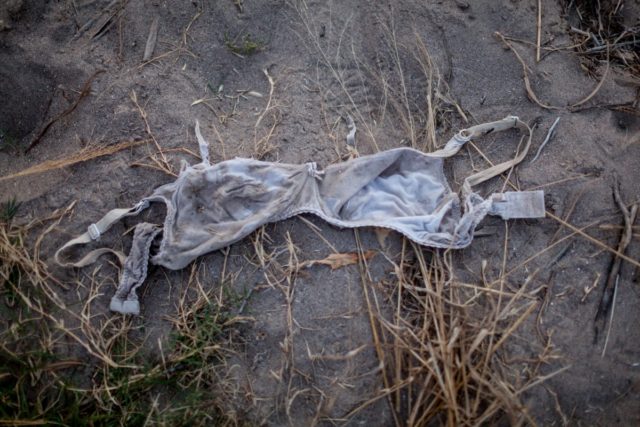Susan Harbage Page (American, b.1959)
Bra (Brasier),from the portfolio Borders and Belonging (2011)
Color inkjet print on cotton rag paper
17″ x 22″
Gallery Purchase
This past semester I had the privilege to study under Dr. Yurika Tamura in Gender and Sexuality Studies 345: Queer Immigration and Diaspora. Through this course, we explore queer theory as it applies to immigration, exile, and diaspora caused by contemporary globalization and transnational economics. While identity categories transcend boundaries, they are often reinforced at the border to align with the new country’s normative standards. It is here, in particular, where governments tend to police sexuality and race to maintain a national ideology.
During the course, we were introduced to Susan Harbage Page’s portfolio, Borders and Belonging. Page photographs personal objects left behind along the U.S.-Mexico border by immigrants attempting to cross. We know nothing about their story other than the belongings they lost. These images of wallets, toothbrushes, and deflated inner tubes to name a few, further humanize the unknown immigrants. They express fear and hope. Through photographing these objects, Page has learned some patterns of events experienced at this border. For instance, if someone leaves behind a bra, as pictured in Bra (Brasier) (2011), then it marks a place of sexual violence. It is a warning sign. We are left wondering about the fate of the objects’ owners.
In all of her work, Page is inspired to indirectly amplify marginalized voices. My class was fortunate to actually speak with the artist over the phone. Page is acutely aware of her privileged position as a white woman and American citizen, which enables her to freely cross the same border without fear or harm. The artist, now an associate professor at UNC Chapel Hill, shared ways in which she has expanded her project. Page began collecting the objects for The Anti-Archive, challenging the idea of an archive which usually centers privileged voices. While I am profoundly moved by her photographs from Objects in the Landscape, I question the ethics of removing the objects from their original place. Like the bra, many objects left behind communicate something both to other travelers and to us, citizens of a country where human beings disappear.
-Michaela Gibbons ’22

